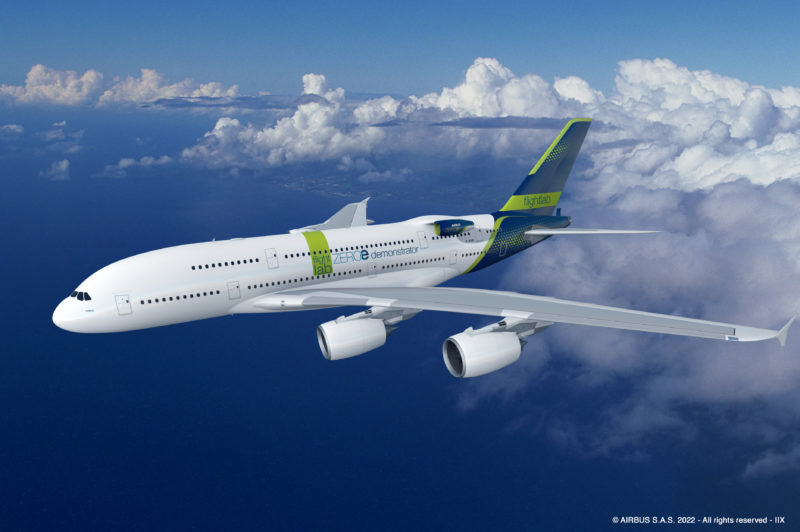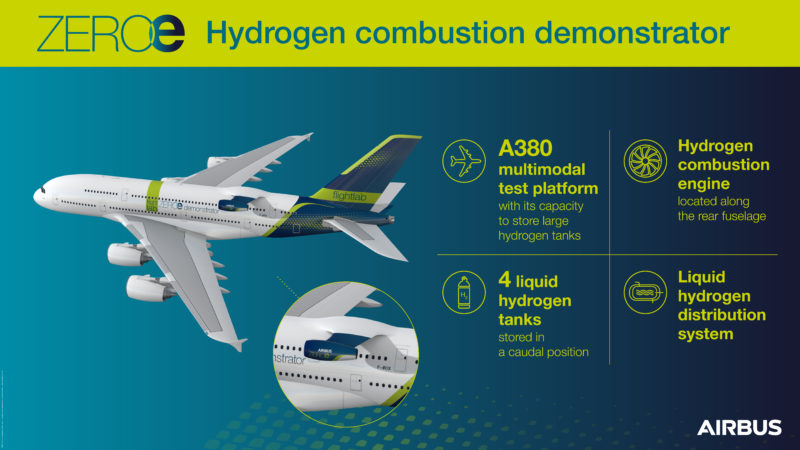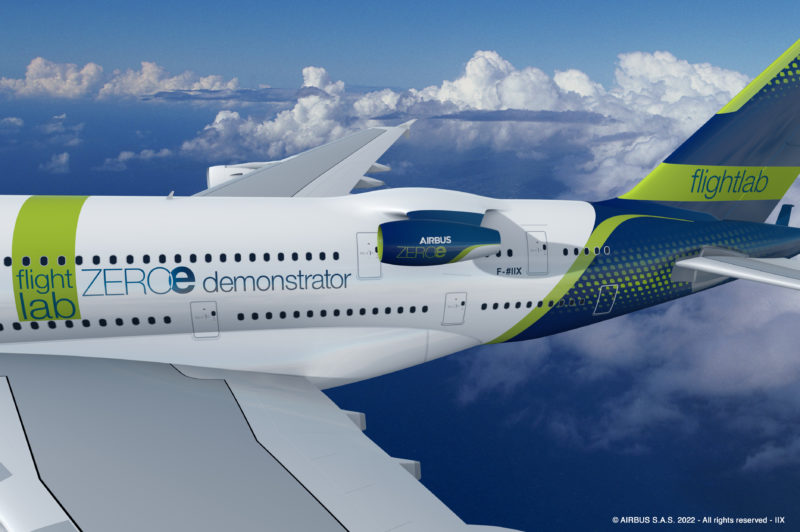Whilst the industry looks towards the use of sustainable fuels, Airbus is to work with CFM International on the development of a hydrogen-powered demonstration programme.

The proposed test platform – Image, Airbus.
Airbus has signed a partnership agreement with CFM International, (a 50/50 joint company between GE and Safran Aircraft Engines). Together, they will collaborate on a hydrogen demonstration programme that will take flight around the middle of this decade.
The programme’s objective is to ground and flight test a direct combustion engine fueled by hydrogen, in preparation for entry-into-service of a zero-emission aircraft by 2035.
The demonstration will use an A380 flying testbed equipped with liquid hydrogen tanks prepared at Airbus facilities in France and Germany.
Airbus will also define the hydrogen propulsion system requirements, oversee flight testing, and provide the A380 platform to test the hydrogen combustion engine in the cruise phase. meanwhile, CFM International will modify the combustor, fuel system, and control system of a GE Passport turbofan to run on hydrogen.

Breaking down the demonstration package – Image, Airbus.
The engine, which is assembled in the US, was selected for this program because of its physical size, advanced turbo machinery, and fuel flow capability.
The GE Passport is currently used in the Bombardier Global 7500 and 8000 aircraft, which was developed from CFM Leap engine family (which is currently used on the Airbus A320neo, Boing 737 MAX and COMAC C919).
It will be mounted along the rear fuselage of the flying testbed to allow engine emissions, including contrails, to be monitored separately from those of the engines powering the aircraft.

The location of the test engine – Image, Airbus.
CFM will execute an extensive ground test program ahead of the A380 flight test.
In Quotes
Sabine Klauke, Airbus Chief Technical Officer sadi
“This is the most significant step undertaken at Airbus to usher in a new era of hydrogen-powered flight since the unveiling of our ZEROe concepts back in September 2020,”
“By leveraging the expertise of American and European engine manufacturers to make progress on hydrogen combustion technology, this international partnership sends a clear message that our industry is committed to making zero-emission flight a reality.”
Gaël Méheust, president & CEO of CFM.
“Hydrogen combustion capability is one of the foundational technologies we are developing and maturing as part of the CFM RISE Program,”
“Bringing together the collective capabilities and experience of CFM, our parent companies, and Airbus, we really do have the dream team in place to successfully demonstrate a hydrogen propulsion system.”
The move to Zero-Carbon Emissions
The industry is slowly moving to Zero-Carbon fuels – be they be bio-derived, Sustainable Air Fuel and in the case of this project – Hydrogen.
And its a big ambition to meet a target of 2025 and have aircraft with net-zero carbon emissions. This means hard development, learning as well as commercial realization – be that defining sources of fuel, engine capability, how the fuel is handled and so on.
Moves like this are a series of steps to enable those retaliations to be met – as well as spark commercial development of products to use the technology.
Welcome to Economy Class and Beyond – Your no-nonsense guide to network news, honest reviews, featuring in-depth coverage, unique research, as well as the humour and madness as I only know how to deliver.
Follow me on Twitter at @EconomyBeyond for the latest updates! You can follow me on Instagram too!
Also remember that we are part of the BoardingArea community, bringing you the latest frequent flyer news from around the world.